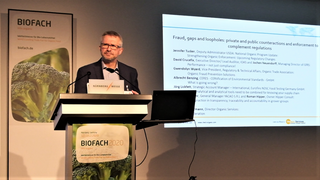Two out of our four events specifically targeted organic integrity: in addition to the presentation on Check Organic, our integrity platform for the organic sector, we held a congress-event on "Fraud, gaps and loopholes: private and public counteractions and enforcement to complement regulations". For this purpose, our director Gerald A. Herrmann brought together an interesting mix of speakers – each of them playing his or her own specific role in enhancing integrity and transparency within the organic sector. Despite the time limit, the nearly two-hour long session allowed for fruitful discussions and left the audience with the overall impression that solutions to efficiently tackle organic fraud exist, and that some efforts are already being made.
More determination is needed to set real milestones
In our opinion, loopholes and gaps for fraud will persist as long as data on organically certified acreage and its potential yield is not digitally collected and published. If supply chain parties don't know how much organic produce can realistically be grown, how shall the sector, the operators, the certifiers and regulators detect where things are going wrong? We are worried that despite all efforts which are being made, the sector will remain unable to truly grab the problem at its roots.
Our proposed solution to this is comparing the “input volumes” starting with (potential) yields and the “output volumes” of a supply chain by mass balancing and thereby checking the plausibility of produced vs. sold organic quantities. For this purpose, we offer the online-platform Check Organic, where the required data can easily be uploaded, where plausibility calculations happen automatically and where an intuitive traffic light system informs all users about the integrity status of suppliers and transactions. In this way, the most common fraud schemes that 'artificially augment' the quantity of organic products (use of falsified certificates and multiple quantity sales using different certificates such as EU-organic, USDA-organic, et al.) can be prevented. Hence all supply chain parties can significantly mitigate fraud risks, being ensured that they are really selling what their labels promise. We are convinced that if a tool like Check Organic is combined in a multifactorial approach alongside other analytical and non-analytical measures and the indispensable regulatory measures, eliminating organic fraud will be possible. Click here for more information, access to video material and powerpoint-slides on Check Organic from BIOFACH2020.
Videos, summaries and slides of the congress presentations
We invite you to click on the links below to read our summaries, watch the videos and find the corresponding PowerPoint-slides of our esteemed speakers:
- Jennifer Tucker, Deputy Administrator USDA: National Organic Program Update: Strengthening Organic Enforcement: Upcoming Regulatory Changes
- David Crucefix, Executive Director/ Lead Auditor, IOAS and Jochen Neuendorff, Managing Director of GfRS: Performance – not just compliance!
- Gwendolyn Wyard, Vice President, Regulatory & Technical Affairs, Organic Trade Association: Organic Fraud Prevention Solutions
- Albrecht Benzing, CERES - CERtification of Environmental Standards - GmbH: What is going wrong?
- Jörg Lickfett, Strategic Account Manager – International, Eurofins NDSC Food Testing Germany GmbH: Non-analytical and analytical tools need to be combined for knowing your supply chain
- Beat Wiederkehr, General Manager YACAO S.R.L and Roman Hipper, Owner Hipper Consult: Best practice in transparency, traceability and accountability in grower groups
If you would like to watch all contributions in one video, please click here.

